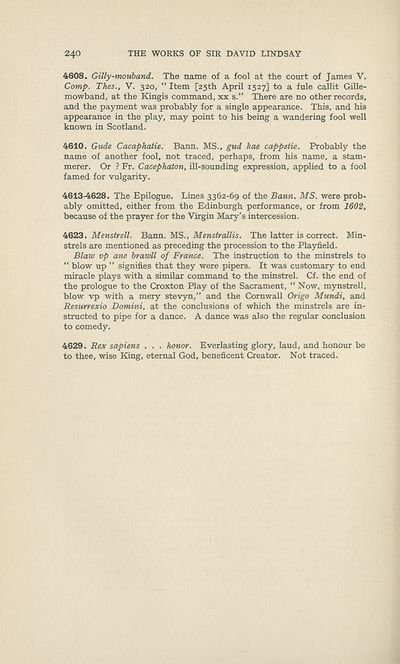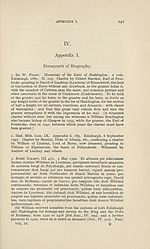Scottish Text Society publications > Third series > Works of Sir David Lindsay of the Mount, 1490-1555 > Volume 4, 1936
(308)
Download files
Complete book:
Individual page:
Thumbnail gallery: Grid view | List view

240
THE WORKS OF SIR DAVID LINDSAY
4608. Gilly-mouband. The name of a fool at the court of James V.
Comp. Thes., V. 320, " Item [25th April 1527] to a fule callit Gille-
mowband, at the Kingis command, xx s.” There are no other records,
and the payment was probably for a single appearance. This, and his
appearance in the play, may point to his being a wandering fool well
known in Scotland.
4610. Gude Cacaphatie. Bann. MS., gud kae cappetie. Probably the
name of another fool, not traced, perhaps, from his name, a stam¬
merer. Or ? Fr. Cacephaton, ill-sounding expression, applied to a fool
famed for vulgarity.
4613-4628. The Epilogue. Lines 3362-69 of the Bann. MS. were prob¬
ably omitted, either from the Edinburgh performance, or from 1602,
because of the prayer for the Virgin Mary’s intercession.
4623. Menstrell. Bann. MS., Menstrallis. The latter is correct. Min¬
strels are mentioned as preceding the procession to the Playfield.
Blaw vp ane brawll of France. The instruction to the minstrels to
“ blow up ” signifies that they were pipers. It was customary to end
miracle plays with a similar command to the minstrel. Cf. the end of
the prologue to the Croxton Play of the Sacrament, “ Now, mynstrell,
blow vp with a mery stevyn,” and the Cornwall Origo Mundi, and
Resurrexio Domini, at the conclusions of which the minstrels are in¬
structed to pipe for a dance. A dance was also the regular conclusion
to comedy.
4629. Rex sapiens . . . honor. Everlasting glory, laud, and honour be
to thee, wise King, eternal God, beneficent Creator. Not traced.
THE WORKS OF SIR DAVID LINDSAY
4608. Gilly-mouband. The name of a fool at the court of James V.
Comp. Thes., V. 320, " Item [25th April 1527] to a fule callit Gille-
mowband, at the Kingis command, xx s.” There are no other records,
and the payment was probably for a single appearance. This, and his
appearance in the play, may point to his being a wandering fool well
known in Scotland.
4610. Gude Cacaphatie. Bann. MS., gud kae cappetie. Probably the
name of another fool, not traced, perhaps, from his name, a stam¬
merer. Or ? Fr. Cacephaton, ill-sounding expression, applied to a fool
famed for vulgarity.
4613-4628. The Epilogue. Lines 3362-69 of the Bann. MS. were prob¬
ably omitted, either from the Edinburgh performance, or from 1602,
because of the prayer for the Virgin Mary’s intercession.
4623. Menstrell. Bann. MS., Menstrallis. The latter is correct. Min¬
strels are mentioned as preceding the procession to the Playfield.
Blaw vp ane brawll of France. The instruction to the minstrels to
“ blow up ” signifies that they were pipers. It was customary to end
miracle plays with a similar command to the minstrel. Cf. the end of
the prologue to the Croxton Play of the Sacrament, “ Now, mynstrell,
blow vp with a mery stevyn,” and the Cornwall Origo Mundi, and
Resurrexio Domini, at the conclusions of which the minstrels are in¬
structed to pipe for a dance. A dance was also the regular conclusion
to comedy.
4629. Rex sapiens . . . honor. Everlasting glory, laud, and honour be
to thee, wise King, eternal God, beneficent Creator. Not traced.
Set display mode to: Large image | Zoom image | Transcription
Images and transcriptions on this page, including medium image downloads, may be used under the Creative Commons Attribution 4.0 International Licence unless otherwise stated. ![]()
| Publications by Scottish clubs > Scottish Text Society publications > Third series > Works of Sir David Lindsay of the Mount, 1490-1555 > Volume 4, 1936 > (308) |
|---|
| Permanent URL | https://digital.nls.uk/107278571 |
|---|
| Shelfmark | SCS.STES3.8 |
|---|---|
| Attribution and copyright: |
|
| Description | A collection of over 100 Scottish texts dating from around 1400 to 1700. Most titles are in Scots, and include editions of poetry, drama, and prose by major Scottish writers such as John Barbour, William Dunbar, Gavin Douglas, and George Buchanan. Edited by a key scholarly publisher of Scotland's literary history, and published from the late 19th century onwards by the Scottish Text Society. Available here are STS series 1-3. |
|---|

